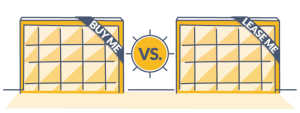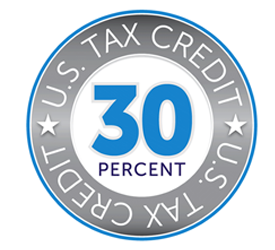
Solar Panels in Arizona – What You Need to Know
With around 300 days of sunshine per year, Phoenix is the officially one of the sunniest cities in the country. It’s no wonder the solar industry has such strong roots here in Phoenix. With continually advancing solar technology and the sunniest city in the country, why isn’t every rooftop covered in solar panels in the valley of the sun? Much like the answer to most questions in today’s world, the answer is money. Greedy utility companies and a high cost of entry are the common explanations, but is that really the case for today’s solar options? Not quite. The truth is, the solar landscape is ever-changing. Pricing, technology, and utility rate plans are all fluid.
Buy or Lease? 
If solar is the right choice for you, how you structure your solar panels may affect more than you think. You can lease your solar panels, or you can purchase them. The way leasing work isn’t much different than leasing a car. You pay monthly to “borrow” the panels on your house, typically for a 20 year term. Instead of cutting a check to APS or SRP every month, you pay a fixed amount every month to the owner of the solar panels. Some leases will be written where the cost increases every year, by 2-3%, but not always. Make sure you know if this is the case with you lease so you can budget appropriately.
The goal of getting a solar lease in place is obviously to offset the cost of your electric bill. With most leases, you should be able to get in for zero out of pocket costs, and pay a monthly bill that is less than your current electric bill. There are always some variables such as size of system, direction of roof, size of roof, etc. It’s also possible to plan for a smaller system, at a much lower cost, but you can’t expect it to cover the entirety of the bill.
At the end of your lease term, you can either buy the system outright, have the leasing company remove it, or leave the system in place and renew a lease with the owner. Whether you buy or lease, do consider that solar panels do lose a little bit of efficiency with age. After 20 years, your system may be providing 85% of its original electrical output
What many homeowners don’t realize, is that to buy solar panels you don’t need to pay for it all upfront. There are loan programs available to purchase your solar panels. When using a loan program, the monthly payment is usually a bit higher, but there are some other distinct advantages to owning your solar panels vs leasing. One HUGE benefit is tax credits. Currently through the year 2019, the federal government provides you a tax credit of 30% when you purchase solar panels. Arizona also offers an additional $1,000 credit.
 For those of you who may not realize, there is a BIG difference between a tax CREDIT and a tax DEDUCTION. For example, the tax credit for solar works like this – 30% of the purchase price is applied to your taxes at the end of the year. So if the system cost $20,000, you get a credit for $6,000. If you owed $10,000 taxes on the year, you could apply your $6,000 credit, and you would only owe the remaining $4,000. (Pro tip #1 – plan according and have your employer take out LESS taxes so you can use the credit at the end of the year. Your paychecks will be higher, and if you don’t use all the credit, you can roll it over to the following tax year!)
For those of you who may not realize, there is a BIG difference between a tax CREDIT and a tax DEDUCTION. For example, the tax credit for solar works like this – 30% of the purchase price is applied to your taxes at the end of the year. So if the system cost $20,000, you get a credit for $6,000. If you owed $10,000 taxes on the year, you could apply your $6,000 credit, and you would only owe the remaining $4,000. (Pro tip #1 – plan according and have your employer take out LESS taxes so you can use the credit at the end of the year. Your paychecks will be higher, and if you don’t use all the credit, you can roll it over to the following tax year!)
Since we’re on the topic of finances, let’s get to the nitty-gritty of what’s happening with solar here in Phoenix with insight from the best in the business, Joey Chiarello with SVS Solutions.
The biggest buzz going on in the solar world right now is the rate case with APS. APS has been in discussion for over a year with the ACC (Arizona Corporation Commission) and local solar companies. At times, solar panels can produce MORE electricity than your home is using, and can be pushed back into the grid. Just exactly how much solar customers should be compensated for when their solar system over produces is the biggest debate.
Your electric is measured in Kilowatt Hours, or kwh’s. Right now APS credits these kwh’s dollar for dollar. This means if your solar system produces an overage during “On Peak” hours you will have a credit for at the On Peak rate. Likewise, overages during an Off Peak hour, you receive credit at the lower off peak rate. A lot of clients that I speak with have been under the impression that any over production was paid back at what’s called a “wholesale” rate. The wholesale rate comes into effect at the end of the year if there are credits left over.
The key to a well-designed system is generating enough off peak credits in the winter so that you can use those credit during summer nights (when it’s still hot outside, but the sun has gone down). If you size your system correctly you will have a credit with your electric company of $5-$10 in the winter and a bill between $20-$40 in the summer, and little to no credits at the end of the year.
In July, major changes are coming. For one, instead of paying you different On Peak/Off Peak rate credits for your overages, APS has decided to pay a fixed rate credit for all over generated power. This has been said to be around 11 cents. Comparatively APS now pays 22 cents on average for On Peak and 7 cents for Off Peak. Personally, I thought this amount was going to be much lower so I am very pleased to see that it has been agreed upon over 10 cents.
At the end of the day the 11 cents will help the return on solar investment continue to be attractive when considering the average inflation APS has been continuing to pain its customers with year over year. One last key change coming in July is that all the current On/Off Peak , 12- 7, 9-9 time advantage plans are going away. There will be three new rate plans and customers will have to pick one, unless they opt for solar beforehand.
A very important thing to understand is when you go solar before this change in July, it allows you to be grandfathered for 20 years under the current “dollar for dollar’ crediting as well as for you to stay on whichever current rate plan you are on. All said and done any homes that are under the current APS Plan will be grandfathered in. This plan will stay with the home, not the person.
Buying and Selling with Solar Panels
A final consideration when investing in solar panels is what happens when you need to sell your house. With a lease, potential buyers must qualify to take over the lease of the panels. If the buyer has enough qualifications to buy a home, they shouldn’t have an issue qualifying for a lease either. The exception to this is when buyers are purchasing at the very tippy top of their price range – the solar lease will go into the buyers Debt-to-Income ratio a lender looks at. It may push the buyers just outside of the allowed amount since the lease is considered an additional debt they are taking on (even though it’s simply replacing the utility bill, and the buyers costs monthly would be lower)
A leased solar system does not typically add value to the property sale, since it’s not owned. An owned system however does add value. Just think – if you had two homes that were identical, but one had free electric bill, don’t you think you’d pay more for that home? For most buyers, an owned and paid off system is a huge perk.
(Pro Tip #2 – When installing solar panels, you should have them installed on a roof that will be structurally sound for years to come. If you need a new roof and are interested in solar panels, by bundling together the roof upgrade and solar panels, you can take the 30% tax credit on the total job, not just the solar panels. Don’t try this with a national leasing brand like Solar City, you’ll need to purchase from a local business to help you with this one!)
For all your solar questions, don’t hesitate to contact:
Joey Chiarello
Solar Integrator
(c) 818-730-0641
(o) 480-689-5000
Joey.Chiarello@svssolutions.com
https://www.svssolutions.com/

Leave a comment